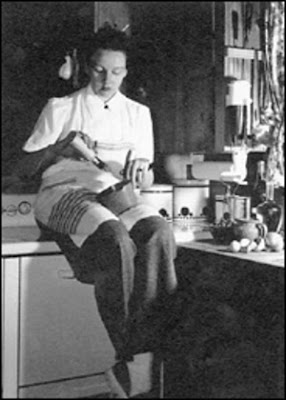In Context: M. F. K.'s Similar Approach to Food
Hemingway, in his rich enjoyment and fascination with food, was by no means alone during the time period of his writing and living. Similarly throughout the United States, cookery book authors and fellow artists, too, associated good food with good living. In one of her many works, With Bold Knife and Fork, M. F. K. Fisher expresses similar sentiment, in reveling in food such as her "own sensual satisfaction, even vicarious, in such things as potato chips and Beluga caviar" (101). Fisher continues to note that "Just writing of my small steady passion for them makes my mouth water in a reassuringly controlled way..." (102). Through these expressions, Fisher emulates Hemingway's own obsession with delicious food, and his desire to eat well throughout all that he consumes. Fisher, also, echoes his dedication to fine drink, and explains that "There is one thing I know I shall never get enough of-- champagne" (103).
Fisher cooking. Photo from here.
Amidst the seventeen chapters, Fisher includes witty descriptions that present eating and food in a way that is both pleasurable and full-bodied. In her chapter "Some Ways to Laugh," Fisher explores various drinks, and she confides her favorite types of alcoholic beverages. For example, she notes that "I indulge in some drinkin-likkas which I do not approve of on aesthetic grounds, but because they interest me or enliven me and occasionally because I am by nature courteous" (278). As a whole, very similar to the approach of Hemingway, alcohol and food is not only an experience of taste, but an experience of all of the senses.
Photo from here.
Additionally, much like Hemingway's descriptions within The Nick Adams Stories, Fisher describes the process of enjoying the preparation of food, and how the cooking itself is a part of the fun. In the chapter "Having Fallen into Place," which focuses on the cooking of vegetables, Fisher describes that "To anyone of my pronounced leanings, vegetables are a physical pleasure to buy and clean and prepare, and then cook and serve forth. I love their colors, and odors, and the feel of them... I also like the people who grow and sell vegetables. Gardeners and greengrocers seem a little fresher than plain shopkeepers..." (163). Overall, Fisher exults in the gathering and measuring of the vegetables and she similarly revels in the environment in which she is able to obtain them. Like Adams preparing his camping meal of spaghetti and beans, Fisher approaches her preparation of vegetables with an anticipation of not only the meal itself, but the experience involved in its creation.
Photo from here.
As a whole, M. F. K. Fisher is only a singular voice and example of food writing during the time of Hemingway's life and works. Fisher, like Hemingway, expresses a sentiment of not eating to live, but rather living to eat, and living to enjoy even in the most mundane seeming of instances, such as a meal. Daughter-in-law and former secretary of Hemingway, Valerie Hemingway recounts that "Of the many things I learned from Ernest Hemingway, one that has stood to me in good stead all my life, is an appreciation for the simple things of life, especially food and drink... He had a keen sense of observation, a curiosity about many things that forced him to learn every aspect of subjects most people don't even think about. Every meal of every day was a unique experience" (95-96). Overall, Fisher, like Hemingway, wrote to capture a mindset of approaching food as fun, necessary, and gratifying.
Works Cited in this Post:
Fisher, M. F. K. With Bold Knife and Fork. Vintage, 2001.
Hemingway, V. "At Hemingway's Table: Food for the Five Senses." The Hemingway Review, vol. 22, no. 1, 2013, pp. 93-99. Project MUSE, doi:10.1353/hem/2013.0020.



Comments
Post a Comment